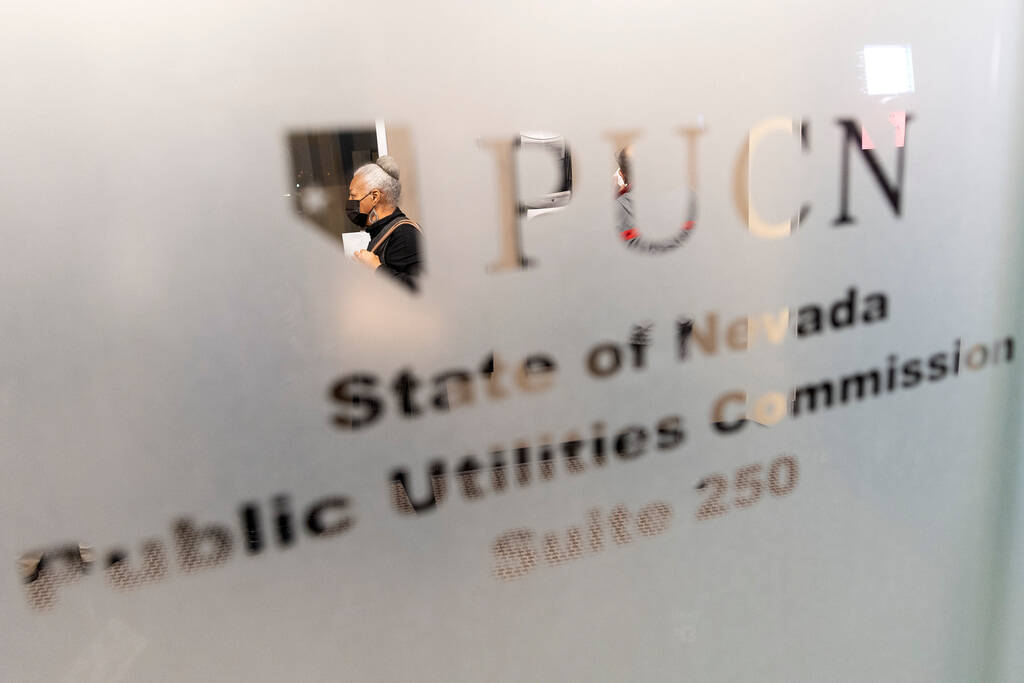NV Energy’s new demand charge likely to stay in place despite objections
NV Energy’s mandatory demand charge will stay in place, according to a draft order from the Public Utilities Commission of Nevada, denying the petition from the Attorney General’s Bureau of Consumer Protection to reverse its decision.
The PUCN filed its draft order Nov. 14, doubling down on its approval of NV Energy’s mandatory demand charge for Southern Nevada customers, rebutting the BCP’s claims on all fronts. According to the draft order, the PUCN called the demand charge “an imperfect solution,” but held that it will give “customers another tool to make their bills more affordable” and will help recoup costs lost from serving net metering customers.
Additionally, the PUCN admonished the BCP for using “the court of public opinion” as evidence in its petition and called on the bureau to educate customers on the costs it takes to serve net metering customers. Net metering allows customers with solar panels to receive credits on their electric bills for the surplus power they generate.
“BCP would do well to educate residential customers, whose interests BCP exists to represent, about the reality under which the vast majority of residential ratepayers are seeing higher power bills than they would if the costs of serving NEM customers were not being shifted to them,” said the draft order.
The PUCN will officially vote on the matter Tuesday.
On Oct. 7, the BCP called on the PUCN to reverse its approval of the demand charge, calling it “unlawful.” The bureau’s petition asked the regulatory body to reconsider its decision on two fronts: the demand charge violates a Nevada law prohibiting mandatory time-of-use rates for all customers and “lacks substantial evidence.”
Additionally, the BCP accused the PUCN of “unreasonably” siding with the utility, saying the demand charge would “take Nevada electric utility ratepayers into uncharted waters.
What is the demand charge?
The demand charge, which was approved for Southern Nevada customers on Sept. 16 by the PUCN, would be mandatory for all residential and small business customers.
The approval of the demand charge creates a two-pronged approach to billing customers each month: how many kilowatts a customer used during their highest 15-minute period of usage combined with the typical per kilowatt hours used each month. But, in April, the per kilowatt hour charge will go down to account for the demand charge.
NV Energy has proposed a 14-cent per kilowatt demand charge. Therefore if a customer uses 2 kilowatts during their 15-minute peak, the demand charge for that day will be 28 cents. All daily demand charges will be added up at the end of the month and applied to the customer’s bill.
Solar customers cannot use net metering credits to offset the cost of the demand charge.
Time-of-use rates
Nevada Revised Statute 704.085, which governs public utilities, prohibits electric utilities and the PUCN from changing or approving any rate schedules that charge customers based on a time of usage. The BCP’s petition claims the demand charge violates the plain language because it would charge customers based on a 15-minute peak in their energy usage per day, rather than solely on how much energy they used.
The PUCN disagrees with the argument, saying the demand charge will rely on a “flat, fixed demand rate that remains the same during every hour of the day and every day of the year.”
“When the Legislature decided to prohibit mandatory time-of-use rates, it did so with the intent to prohibit time-of-use rates, not demand charges or any other type of billing component that is not a time- of-use rate,” said the PUCN in the draft order.
‘Lacks substantial evidence’
Another argument the BCP made was the demand charge lacked evidence to impose onto Nevada customers. The PUCN also disagrees with this.
According to the draft order, the commission chose to adopt the demand charge based on evidence suggesting it will result in customers “more equitably” paying for the costs it takes to serve them and provides “an additional method for price-sensitive customers to reduce their bills through changes in behavior.”
Additionally, the PUCN stated there is a large discrepancy in cost recovery when it comes to serving net metering customers. According to NV Energy, the rate design for net metering customers does not cover the full cost of serving them, which results in $50 million being collected from non-net metering customers annually to recoup costs.
Furthermore, the draft order states the demand charge “is not the best tool to solve the under-collection of costs” from net metering customers, but “simply ignoring the issue, and forcing Nevada’s non-solar customers to continue to pay higher rates, is not an acceptable path forward.”
Contact Emerson Drewes at edrewes@reviewjournal.com. Follow @EmersonDrewes on X.




















